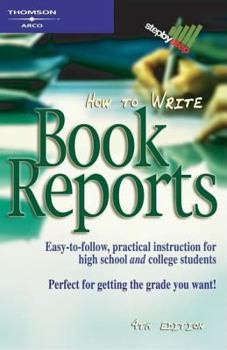How to Write Book Reports
Select Format
Select Condition 
Book Overview
Discusses the various types of book reviews and offers advice on the organization and writing of reports on fiction, plays, biographies, and collections of shorter works.
Format:Paperback
Language:English
ISBN:0768910803
ISBN13:9780768910803
Release Date:July 2002
Publisher:ARCO
Length:90 Pages
Weight:0.25 lbs.
Dimensions:0.3" x 6.2" x 9.0"
Customer Reviews
2 ratings
Reviewing made easy... and fun!
Published by Thriftbooks.com User , 21 years ago
For all of us who have reviewing as a hobby - and especially for college students, to whom this work is targeted to a text that shows the correct way to present an opinion is a godsend. In today's world, most of us are eager to express our feelings, to communicate our own impressions on everything that surrounds us. Sadly, a lot of our credibility slips through the cracks because of our own inability to present a valid argument, independently of it being true or not (after all, who owns The Truth?). As stated in Chapter 1, under the title of "The rewards of writing reviews", "You will learn to analyze your tastes, your likes, and dislikes, and back up your statements of opinion with sound reasoning" (Page 4). "How to write book reports" includes all the tools and suggestions needed for effective reviewing. I liked very much the idea of presenting the "History of the Essay", as a reference on how it all began, since right up to the sixteenth century, as the author points out, everything that was considered culturally acceptable was always written in verse. It was since then, that qualified reviewers had been relied upon for almost everything mankind has been interested in trying. Sova devotes a whole chapter to the qualifications of the reviewer, be he an expert scholar or a starting student looking for good grades. Organization is the key not only of effective review-writing but also of everything that makes a good impression. The book divides the actual task of writing the report into three phases: preparing, organizing and writing it, providing in this way an actual blueprint for a flawless work. There are also suggestions on how to review the different literary genres, and an Appendix with further exercises to be done either orally or written, to provide fresh outlooks to the task. To give practical examples, a few sample reviews are provided; of a novel, a play, a short-story collection and a biography. I hesitated at first about buying this slim volume because I saw it too high school, instead of professionally, oriented. Once I looked at its contents, I felt almost sure I had made a good choice. After having started to read it, I knew I had indeed purchased a simple but valuable volume. The book takes the fear (and boredom as well), out of reviewing assignments. The techniques suggested can be applied not only to literature but to anything related to art and culture, e.g.: music, cinema, graphic arts, etc. Dawn Sova intends to make the task of writing reviews an enjoyable experience, as she puts it herself "Reading, especially outside reading, should be fun" (Page 3). Throughout the book and in only ninety pages, she achieves this with a bang. As a final suggestion, I would also recommend that you visit the publisher's website, called The Education Supersite, especially if you are just starting your own college period. It can be an invaluable resource as well if you are planning to go back to school, to find out about
The Next Best Writing
Published by Thriftbooks.com User , 23 years ago
You already know how to write book reports if you can say what you dislike about a book or why you like it. Book reporting blends opinions with details: you take personal reactions based on your experiences and knowledge from life and other books; then back them up with facts and incidents from the book and with logic and reasoning. Along the way, you need to think not only what the book was about but also why it was written: for example, literature can bring out emotions or teach us something. So in the end, you want to say if the book did what the author wanted it to and if it is worth reading: these are the last thoughts that you leave with the reader. Harry Teitelbaum writes so well that what he says can be applied to any kind of writing, and I like to think that book reporting is the next best thing to the actual writing. His book leads in to other books on short, to the point writing: Mervin Block's WRITING BROADCAST NEWS, Syd Field's SCREENPLAY, Louisa Peat O'Neil's TRAVEL WRITING, and Elizabeth Penfield's SHORT TAKES.





